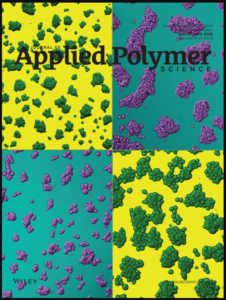In the latest issue of Journal of Applied Polymer Science researchers within Mistra Future Fashion presents their results on a new efficient method for sustainable recycling of PET. By using the nanoclay ”Perkalite” as a catalyst instead of more commonly used heavy metals in the recycling process we stand to gain both in terms of decreased toxic metal emission and a decrease in energy consumption.
When attempting to recycle PET in a textile-to-textile scenario the quality of the used fiber is often not good enough to be used in re-production of textile. One method to enhance the quality of the used fiber is to completely break down, depolymerize, the PET into pure building blocks, monomers, before it can be manufactured into high quality polyester textile again. The break down process, glycolysis in this case, requires a catalyst. Different forms of heavy metals are most commonly used as catalysts, but by instead using the nanoclay “Perkalite” researchers have now demonstrated significant advantages. After depolymerization in the presence of the nanocatalyst, the main product obtained is the monomer bis(2-hydroxylethyl) terephthalate (BHET) with high purity. The BHET monomers could then directly serve as starting materials in further polymerization into recycled virgin quality PET, and contribute to a circular solution of the synthetic polymer.
Furthermore, when adding an extra step prior to glycolysis, a predegradation step, further benefits were demonstrated. Compared with the direct glycolysis of PET, the addition of a predegradation step with “Perkalite” was shown to reduce the reaction time needed to reach depolymerization. The additional step also allows for lower reaction temperatures, which means less energy consumption.
PET (poly ethylene terephthalate) is the fourth most produced polymer in the world. The success of PET arises from its excellent mechanical properties, process-ability and low price point, which makes it suitable for fiber application. At present, PET fiber is the most commonly used fiber in the textile industry and approximately 70 billion barrels of oil are used in the manufacturing of virgin polyester each year. The high usage of virgin PET fiber is alarming since the manufacturing process demands high volumes of petroleum resources, it generates astonishingly high levels of waste and there is CO2 emission related to both the production and disposal of the fibers. In order to save energy and the environment efficient recycling of postconsumer PET is necessary.
The article is written by Zengwei Guo and Karin Lindqvist from Swerea IVF and Hanna de la Motte from RISE. To learn more, please read the full article in Journal of Applied Polymer Science.




